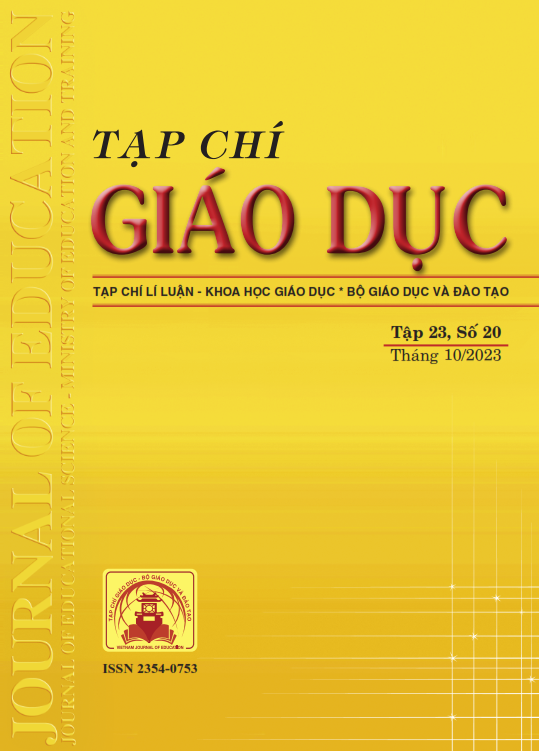Một số giải pháp phát triển tư duy phản biện cho sinh viên ngành Sư phạm Địa lí, Trường Đại học Cần Thơ
Tóm tắt
Developing critical thinking for students is crucial to enhance their capacity to think independently and creatively, meeting the increasingly demanding requirements of the profession and society. This study aims to propose some solutions to develop critical thinking for students majoring in Geography Pedagogy at Can Tho University. The research results show that a number of solutions need to be implemented, including: improving awareness for lecturers and students, changing the form of classroom organization, innovating teaching methods - testing, assessing and closely supervising training/teaching activities. In order to develop critical thinking for students of Geography Pedagogy at Can Tho University, it is necessary to prioritize measures to improve the activeness of learners' thinking, including teaching and learning with new methods, assessment of learning outcomes, oriented to developing practical capacity and creative thinking and relating practical knowledge in the process of teaching and learning, etc.
Tài liệu tham khảo
Bloom, B. S. (1956). Taxonomy of educational objectives: The classification of educational goals. Handbook I: Cognitive domain. London: Longman.
Butler, H. A., Pentoney, C., & Bong, M. P. (2017). Predicting real-world outcomes: Critical thinking ability is a better predictor of life decisions than intelligence. Thinking Skills and Creativity, 25, 38-46. http://dx.doi.org/10.1016/j.tsc.2017.06.005
Butt, G. (2011). Geography, education and the future. New York: Continuum.
Cameron, P., & Richmond, G. (2002). Critical Thinking across the Curriculum. Community College Enterprise, 8, 59-70.
Castree, N. (2000). Professionalisation, activism, and the university: whither “critical geography”? Environment and Planning A, 32, 955-970.
Cloke, C. A. G. (2013). Introducing Human Geographies, (3rd ed.). Hoboken: Taylor and Francis.
Desbiens, C., & Smith, N. (1999). The International Critical Geography Group: forbidden optimism. Environment and Planning D: Society and Space, 17(4), 379-382.
Đoàn Văn Điều (2017). Mức độ đạt được kĩ năng tư duy phê phán của sinh viên Trường Đại học Sư phạm Thành phố Hồ Chí Minh. Tạp chí Khoa học, Trường Đại học Sư phạm Thành phố Hồ Chí Minh, 14, 5-11.
Fisher, A. (2001). Critical thinking: An introduction. Cambridge, U.K. New York: Cambridge University Press.
Hồ Vũ Khuê Ngọc, Võ Đại Thành Nhân (2013). Giáo dục tư duy phản biện cho sinh viên Việt Nam: Bài học kinh nghiệm từ Nhật Bản. http://dised.danang.gov.vn/images/Pages_from_Tap_chi_so_34-9.pdf
Leicester, M. (2010). Teaching critical thinking skills. New York: Continuum.
Mason, M. (2008). Critical thinking and learning. Oxford: Blackwell.
McWhorter, K. T. (2011). Study and critical thinking skills in college (7th ed.). Boston: Longman.
Paul, R., & Elder, L. (2008). The miniature guide to critical thinking concepts and tools. Foundation for Critical Thinking Press.
Trịnh Chí Thâm (2015). Nhận thức của giảng viên về việc phát triển tư duy phản biện cho sinh viên ngành Sư phạm Địa lí Trường Đại học Cần Thơ, Việt Nam. Tạp chí Khoa học, Trường Đại học Cần Thơ, 1, 96-109.
Trịnh Chí Thâm (2016). Những rào cản truyền thống và văn hóa trong việc phát triển tư duy phản biện cho sinh viên ngành Sư phạm Địa lí Trường Đại học Cần Thơ. Kỉ yếu hội thảo khoa học quốc gia “Đổi mới phương pháp giảng dạy trong các trường sư phạm theo hướng phát triển năng lực người học”, Trường Đại học Sư phạm Thành phố Hồ Chí Minh, tr 148-159.
Trịnh Chí Thâm (2017). Những điều kiện cần thiết nhằm phát triển tư duy phản biện cho sinh viên đại học. Tạp chí Dạy và Học ngày nay, 6, 61-63.
Võ Văn Ban, Bùi Ngọc Quân (2017). Rèn luyện khả năng tư duy phản biện cho sinh viên trong quá trình dạy học bậc đại học. Tạp chí Khoa học, Trường Đại học Sư phạm Thành phố Hồ Chí Minh, 14, 125-132.
Vũ Thế Dũng (2017). Tư duy phản biện dành cho sinh viên BKU. https://www.slideshare.net/vuthedung1/critical-thinking-for-student-april-2017
Tải xuống
Đã Xuất bản
Cách trích dẫn
Số
Chuyên mục
Giấy phép

Tác phẩm này được cấp phép theo Ghi nhận tác giả của Creative Commons Giấy phép quốc tế 4.0 .












